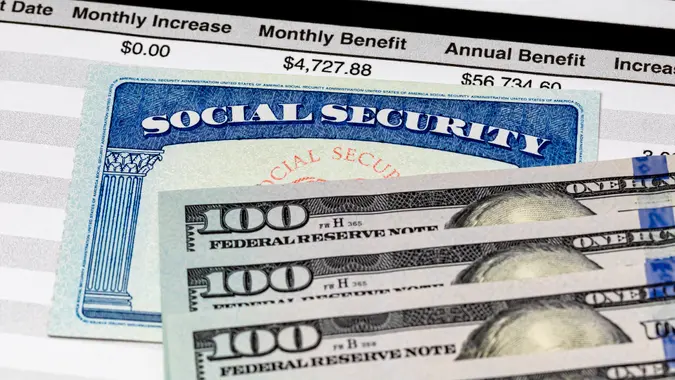What Age Do I Need To Start Worrying About Social Security?

Commitment to Our Readers
GOBankingRates' editorial team is committed to bringing you unbiased reviews and information. We use data-driven methodologies to evaluate financial products and services - our reviews and ratings are not influenced by advertisers. You can read more about our editorial guidelines and our products and services review methodology.

20 Years
Helping You Live Richer

Reviewed
by Experts

Trusted by
Millions of Readers
Most workers know the basics about Social Security but don’t have an intimate understanding of how the program operates. Social Security is not some static retirement income program that guarantees a pot of gold at the end of your career. Rather, Social Security is ever-evolving, and the system that’s in place today might be significantly different by the time you actually retire. At various phases of your career, there are certain aspects of Social Security that you should pay particular attention to.
When You First Start Working
If you’re just starting to work, Social Security and retirement might seem like a lifetime away. But the earlier you can start preparing, the better. When you first enter the workforce, your first potential Social Security check may be 40 or more years away. It’s a near-certainty that there will be some changes to Social Security over four decades or more.
In fact, some of those changes may be coming sooner rather than later. According to the latest report from the Social Security Trustees, the Social Security Trust fund may become depleted by 2033. While this doesn’t mean that Social Security will run out, it does mean that benefits may be reduced. Other proposals have the full retirement age being raised in order to maintain benefits. Whatever the case, the point is that over the next 10 years, many changes are likely to be proposed to Social Security, and it behooves American taxpayers to pay close attention to any potential legislation.
At this stage, the best way you can ensure a well-funded retirement is to not rely on Social Security but to maximize your own savings. Maximizing contributions to your 401(k) plan and/or IRA accounts is a great way to get both current tax deductions and the benefits of long-term compound interest on your investments. Even if Social Security remains in place down the road, having well-funded retirement accounts is your best guarantee of an enjoyable retirement.
In Mid-Career
In order to qualify for Social Security payouts, you need to earn 40 “quarters of coverage” in your working career. The Social Security Administration defines one-quarter of coverage as earnings of $1,470 for 2021, rising to $1,510 for 2022. If you have been working sporadically, under-the-radar side gigs or are otherwise not paying enough into Social Security, you may not qualify for Social Security even when you retire. Mid-career is a good time to be sure you’re on track to qualify for Social Security.
It’s also important to keep an eye on the Social Security wage base, particularly if you’re a high earner. The Social Security wage base is the amount of income that is taxed for Social Security purposes. For 2021, the wage base limit is $142,800, rising to $147,000 in 2022. This amount is changed frequently in response to inflation. If you earn more than the Social Security wage base, you’ll keep more of your pay because that portion of your income avoids the Old-Age, Survivors, and Disability Insurance (OASDI) portion of the Social Security tax. This essentially amounts to a 6.2% pay boost on this portion of your income. A smart idea to help shore up your retirement is to take this “excess” money and put it into your own retirement savings.
In Late Career
As you enter your late career, it’s time to make decisions about your retirement based on concrete information. Nearing retirement, you should have a good approximation of the amount of personal savings you’ll have. This can help you determine your optimal age for beginning Social Security payouts. Although you can start payouts as early as age 62, the amount you receive per month will be permanently reduced. Depending on the value of your retirement accounts, you may need to start payments early, or you might be in the position that you can defer them until age 70. Your late career is when you should start addressing these decisions.
More From GOBankingRates
 Written by
Written by  Edited by
Edited by 
























